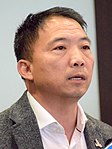
A | B | C | D | E | F | G | H | CH | I | J | K | L | M | N | O | P | Q | R | S | T | U | V | W | X | Y | Z | 0 | 1 | 2 | 3 | 4 | 5 | 6 | 7 | 8 | 9
| |||||||||||||||||||||||||||||||||||||||||||||||||||||||||||||||||||||||||||||||||||||||||||||
26 lists for Geographical Constituencies 5 lists for Functional Constituencies | |||||||||||||||||||||||||||||||||||||||||||||||||||||||||||||||||||||||||||||||||||||||||||||
|---|---|---|---|---|---|---|---|---|---|---|---|---|---|---|---|---|---|---|---|---|---|---|---|---|---|---|---|---|---|---|---|---|---|---|---|---|---|---|---|---|---|---|---|---|---|---|---|---|---|---|---|---|---|---|---|---|---|---|---|---|---|---|---|---|---|---|---|---|---|---|---|---|---|---|---|---|---|---|---|---|---|---|---|---|---|---|---|---|---|---|---|---|---|
| Turnout | 606,761 (13.62%) | ||||||||||||||||||||||||||||||||||||||||||||||||||||||||||||||||||||||||||||||||||||||||||||
| |||||||||||||||||||||||||||||||||||||||||||||||||||||||||||||||||||||||||||||||||||||||||||||
The 2020 Hong Kong pro-democracy primaries were held on 11 and 12 July 2020 for selecting the numbers of pro-democracy candidates for the subsequently postponed 2020 Legislative Council election to maximise the chance for the pro-democrats to achieve a majority in the 70-seat Legislative Council.
With a turnout of more than 600,000, which equals to nearly half of votes received by the pro-democracy camp in the 2016 general election, it was the most-participated primary held in the history of Hong Kong, despite the SAR government's threats of the organisers' potential breaching of the newly imposed national security law.
Traditional pro-democrat parties lost ground to the localist new faces, with an unofficial six-person alliance led by Joshua Wong and Nathan Law of the disbanded Demosistō becoming the biggest winner in the primaries. The candidates they endorsed also emerged as either top or runner-up candidates in their respective constituencies.
55 candidates and participants were arrested under the national security law on 6 January 2021, of which 47 were officially charged with conspiracy to commit subversion.
Background
In 2019 amid the historic anti-extradition protests and the pro-democracy landslide in the District Council elections, legal scholar Benny Tai, one of the initiators of the 2014 Occupy protests, put forward a plan for the pro-democrats to win a majority of the seats in the Legislative Council to block the government's bills including the expected legislation of the Article 23 of the Basic Law which would in turn put pressure on the government to implement the five key demands of the protest movement. Based on prior experience, where excessive numbers of candidates split the pro-democratic votes in the 2016 election, he proposed a primary election within the pro-democracy camp to maximise the chance for the pro-democrats to win more seats by setting a limit on the numbers of candidates and avoid wasting votes.[1] Then, Benny Tai expects those elected legislative councillors to execute so-called "10 steps to burn with us", veto the Hong Kong SAR government's Budget bill without any reason, making a constitutional crisis and forcing the resignation of the Hong Kong SAR Chief Executive.[2]
Mechanism
To be eligible for the primaries, each candidate had to obtain at least 100 registered voter nominations and pay a deposit of HK$10,000. The election, organised by Benny Tai and former Legislative Council member Au Nok-hin,[3] coordinated by Power for Democracy, was set to take place from 11 to 12 July between 9 am and 9 pm. The voting system was designed by the Hong Kong Public Opinion Research Institute (PORI), which also conducted polls on the recommended candidates. The surveyed results would be used to consolidate the final list of nominees for each seat in the official election in September. Voters were required to submit proof of residency or electoral register identification, and bring a smartphone to designated polling stations where they would scan the QR code and fill out their personal details to vote.[4]
Nominations
A total of 52 nomination lists were received during the nomination period for all five geographical constituencies, the five-seat District Council (Second) and Health Services functional constituency. Most potential candidates pledged their willingness to coordinate with organisers, except for political party Civic Passion and New Territories East candidate Law Ting-fai who declined to join the primaries.[4]
The Kwai Chung-based small political group Neighbourhood and Worker's Service Centre (NWSC) which held one seat in the legislature also declared they would not follow the agreement in which a losing candidate in the primaries would not participate in the general election. Instead, the NWSC suggested it may drop out in the latter stage if the poll numbers suggested the candidate had no chance of winning. There was a backlash among the pro-democrats towards the NWSC, which was accused of undermining the mechanism of the primaries. The NWSC later withdrew their candidacy altogether and stated that they would not field any candidate in the general election.[5]

| Constituency | No. of nominations | Target seats | Total seats | |
|---|---|---|---|---|
| Primaries | General | |||
| Hong Kong Island | 8 | 4 | 4 | 6 |
| Kowloon West | 9 | 4 | 4 | 6 |
| Kowloon East | 6 | 5 | 3 | 5 |
| New Territories West | 8 | 6 | 6 | 9 |
| New Territories East | 12 | 7 | 6–7 | 9 |
| District Council (Second) | 5 | 4 | 3–4 | 5 |
| Health Services | 4 | 1 | 1 | 1 |
| TOTAL | 52 | 31 | 27–29 | 41 |
Security law and legal threats
On 30 June, the National People's Congress Standing Committee (NPCSC) approved the final draft of the national security legislation for Hong Kong. Hours after the approval, leading members of pro-democracy group Demosistō Joshua Wong, Nathan Law, Agnes Chow and Jeffrey Ngo announced their departure from the party. Demosistō members had been repeatedly barred from standing for election with authorities citing their previous stance on "self-determination" for the city, of which Wong and Law were also running in the upcoming primaries as Demosistō members. Subsequently, Demosistō declared that it would disband after the mass resignations on the same day.[6] Few days after, Nathan Law said he had fled Hong Kong in response to the security law.[7] He later dropped out from the primaries and endorsed Tiffany Yuen.[8]
Secretary for Constitutional and Mainland Affairs Erick Tsang warned that the primaries might violate the new Beijing-imposed national security law. Tsang said one of the objectives of the primaries was to win a majority of seats in the legislature and subsequently vote against the budget. He added this could contravene clauses in the new law prohibiting secession, subversion and collusion with foreign powers. Benny Tai refuted the claim by saying such advocacy work was in accordance with the principles of the Basic Law. He added that vetoing the budget would not constitute "seriously interfering in, disrupting, or undermining the performance of duties and functions" of the government under Article 22 of the new law because the chief executive has the power to dismiss the legislature and call a by-election.[9]
On 10 July one day before the primaries, the Housing Authority sent out a mass letter saying all District Councillors were barred from using their offices as polling stations or for any purposes other than related to district council activities. It warned that action might be taken against the District Councillors who were found to have violated terms in their rental contracts. A pro-democracy ice cream shop also had to scrap the plan to become a polling station after the property managers warned their participation could violate the tenancy agreement.[10] At night, Hong Kong Police raided the Public Opinion Research Institute (PORI) office in Wong Chuk Hang, accusing the organisation of dishonest use of a computer. Au Nok-hin said the police move was to suppress the weekend voting and cast a "deterrent effect" on organisers and supporters.[11]
Results

Over 590,000 electronic ballots and more than 20,000 paper ballots were recorded throughout the two-day vote, more than 13 per cent of the total number of registered voters and far exceeding the organisers' expected turnout of 170,000. Despite the national security law and legal threats, "Hong Kong people have made history again – another miracle happened in Hong Kong," Benny Tai said. "Hong Kong people – after all these years, since 2003 – have demonstrated to the world, and also to the authorities, that we have not given up to strive for democracy."[12]
Traditional parties lost ground in most of the direct constituencies to the localist new faces, with Democratic Party incumbent legislator Helena Wong only coming seventh in her Kowloon West constituency.[13] Former legislator "Long Hair" Leung Kwok-hung of the League of Social Democrats managed only ninth place in New Territories East for which only the top seven candidates would run in the general election.[13] Joseph Lee, incumbent legislator of the Health Services constituency lost to Winnie Yu of the labour union Hospital Authority Employees Alliance, which had launched a labour strike during the anti-extradition bill protests. Candidates from numerous small parties were wiped out, including Carol Ng from the Labour Party, who lost in New Territories West.[13]
Localist candidates emerged as the new force in the primaries, with an unofficial six-person alliance led by former Demosistō secretary-general Joshua Wong, incumbent legislator Eddie Chu and endorsed by withdrawn candidate Nathan Law, all became either the top or runner-up candidate in their respective constituencies. Wong himself was the top candidate in Kowloon East, while Eddie Chu and former journalist Gwyneth Ho came first in New Territories West and New Territories East respectively.[13] Tiffany Yuen who was endorsed by Nathan Law and activist Sunny Cheung also came in second in Hong Kong Island and Kowloon West respectively, while activist Lester Shum came in second in the District Council (Second) and Winnie Yu won the Health Services functional constituency.
| Political Affiliation | Geographical Constituencies | Functional Constituencies | Total elected | ||||||||
|---|---|---|---|---|---|---|---|---|---|---|---|
| Popular vote | % | List | Elected | Popular vote | % | List | Elected | ||||
| Democratic Party | 77,251 | 12.78 | 5 | 4 | 318,621 | 59.75 | 2 | 2 | 6 | ||
| Civic Party | 73,054 | 12.08 | 4 | 4 | 10,579 | 1.98 | 1 | 0 | 4 | ||
| People Power | 28,081 | 4.64 | 2 | 2 | — | — | — | — | 2 | ||
| League of Social Democrats | 34,962 | 5.78 | 2 | 1 | — | — | — | — | 1 | ||
| Neo Democrats | 15,021 | 2.48 | 2 | 1 | — | — | — | — | 1 | ||
| HK First | 9,308 | 1.54 | 1 | 1 | — | — | — | — | 1 | ||
| Hong Kong Association for Democracy and People's Livelihood | 8,776 | 1.45 | 2 | 1 | — | — | — | — | 1 | ||
| Labour Party | 10,860 | 1.80 | 1 | 0 | — | — | — | — | 0 | ||
| Community Alliance | 1,489 | 0.25 | 1 | 0 | — | — | — | — | 0 | ||
| Professionals Guild | — | — | — | — | 218 | 0.04 | 1 | 0 | 0 | ||
| Independent democrats
Zdroj:https://en.wikipedia.org?pojem=2020_Hong_Kong_pro-democracy_primaries Text je dostupný za podmienok Creative Commons Attribution/Share-Alike License 3.0 Unported; prípadne za ďalších podmienok. Podrobnejšie informácie nájdete na stránke Podmienky použitia.
Analytika
Antropológia Aplikované vedy Bibliometria Dejiny vedy Encyklopédie Filozofia vedy Forenzné vedy Humanitné vedy Knižničná veda Kryogenika Kryptológia Kulturológia Literárna veda Medzidisciplinárne oblasti Metódy kvantitatívnej analýzy Metavedy Metodika Text je dostupný za podmienok Creative
Commons Attribution/Share-Alike License 3.0 Unported; prípadne za ďalších
podmienok. www.astronomia.sk | www.biologia.sk | www.botanika.sk | www.dejiny.sk | www.economy.sk | www.elektrotechnika.sk | www.estetika.sk | www.farmakologia.sk | www.filozofia.sk | Fyzika | www.futurologia.sk | www.genetika.sk | www.chemia.sk | www.lingvistika.sk | www.politologia.sk | www.psychologia.sk | www.sexuologia.sk | www.sociologia.sk | www.veda.sk I www.zoologia.sk | |||||||||||








